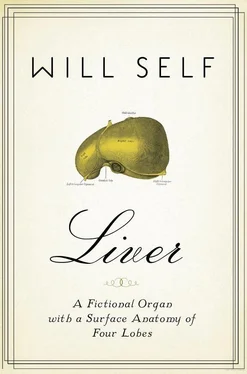Blood. Or even,  , estate cars idling in the Mid-East car park, urgent blood on their flanks, their snouts
, estate cars idling in the Mid-East car park, urgent blood on their flanks, their snouts  noses. Up in the treatment rooms, the operating theatres and the intensive-care wards there were plenty of bodies pulled back from the edge of the abyss; jolted with electricity and then pumped with factors 1 through 8. Were these rollings away of the stone any less mysterious than her own? She had witnessed them all her working life — and were the arisen any more grateful, any more content? Did they not subside, soon enough, into the dull mulch of ordinary existence, cursing their miraculously humdrum lives?
noses. Up in the treatment rooms, the operating theatres and the intensive-care wards there were plenty of bodies pulled back from the edge of the abyss; jolted with electricity and then pumped with factors 1 through 8. Were these rollings away of the stone any less mysterious than her own? She had witnessed them all her working life — and were the arisen any more grateful, any more content? Did they not subside, soon enough, into the dull mulch of ordinary existence, cursing their miraculously humdrum lives?
It was Karl — her bellboy — who showed them up and up, to a room in the converted attics of the old townhouse, although he made no indication of having recognized her, except for saying ‘Good evening, madam’ in English, as he ushered her in through the door.
Joyce had an impression of queered familiarity. Her previous room at the Widder, with its blond-wood mirrored cabinets, mirror-topped desk and coffee table, its riot of cut glass and urns of fresh-dying blooms, had been crushed to fit under the sloping roof. But she had no real time to take this in: Ueli switched off the lights and pushed her against the wall; one of his hands clutched her right breast, the other she felt coming up under the hem of her dress.
She did not mind the moustache that grew immediately on her top lip, nor the strange tongue that flexed in her mouth. A kiss — always a thrilling taste of the essence of another, from adolescence on: their sweetness, their sourness — the loneliness of the nervy cave, lined with tombstones, where the hermit I lived.
She did not mind the rush and fumble. She felt no sexual arousal, yet was excited by her own suppleness, as she backed and wove between the furniture, absorbing his onslaught until they toppled on to the bed.
When, in the mêlée of snort and paw, Joyce cried ‘Stop it, Ueli!’, he did at once. She rose and bade him unzip her dress, which she saw no cause to damage.
While in the dark and delusive room she searched for a hanger, he, rumpled by his urges, pulled the black wave of his jacket over his amphibious head, then kicked out with his trousers.
She did not mind the way he yanked her underwear, nor the push-down of limbs, then the drag-up of covers. They thrashed about, and Joyce wondered, where are the aches and pains, the cramping of ageing muscles, and the tightening of tendons that, over the decades, had hobbled their love-making? This wanton coupling belonged to a time when she and Derry were newly married and had overcome their shyness, when they fitted together: parts of a single organism engaged in complex self-pleasuring. She remembered the dry greasiness of the condom as she had rolled it on to him, and the live-wiriness of his penis. Benedictus qui venit in nomine Domini!
She did not mind when Ueli turned her over, nor when she felt him digging at and then into her. She did not mind the astringency of his cologne and the shellacking of his sweat, nor yet intermittent suffocation in the crisp Widder pillows; but she did mind, very much, when he stopped and, rearing up over her, began to describe upon her skin the botched geometry of his caresses.
She had gained her shaming night sight; flung from cabinet, to desk, to window, Joyce saw their mirror-images: the portly pink Swiss, his sleek hair mussed, babbling love twaddle to the cadaver coiled beneath him. She saw this, and she saw also that Marianne Kreutzer, who sat quietly on an upright chair by the door, had seen it, too. Then Joyce snapped: ‘Don’t fondle my bum, I’m seventy years old!’
After that he finished off brutally — three or four rams into her and all of Ueli went blubbery. He slid away, then collapsed beside her, panting. Osanna in excelsis!
Later, when Joyce was sure Marianne had gone, she got up and, feeling Weiss’s semen trickling out of her, went carefully into the bathroom, where she encountered the pathos of the hand towels.
At dawn on 14 July, Joyce Beddoes awoke in the small bedroom of her flat at 34 Saatlenstrasse, in the Zürich suburb of Oerlikon. She did not lie there tangled in dream shreds, or stare woozily at the pictures on the white walls. For her there was no confusion between sleep and wakefulness, and nor were there any pictures in the bedroom. The only representations in the flat at all were two postcards: one propped on the thermostat unit in the kitchenette, the other leaning against a jar that Joyce had intended for rice but never filled. The first was a banal Alpine scene of picturesque peaks reflected in a limpid lake; the second a reproduction of a painting by Trouget, the great contemporary master of figuration, whose acquaintance Joyce’s daughter had laid claim to, despite the very glancing, bar-room nature of their association.
Getting up, going to the toilet, then dressing — these Joyce did automatically. In the kitchenette she made coffee and prepared a bowl of muesli with soya milk. If she noticed the Trouget postcard at all it was not because of what it depicted — the artist’s usual subject matter and conceit, a bourgeois in a suit, distressingly upended — but only to recall buying it; and the other card, from a visit to the Kunsthaus weeks before, because that’s what you did, didn’t you?
She sat by the window eating her muesli and drinking her coffee. She looked down into the dull street, along which came a figure with the draught-animal plod of a woman bearing heavy shopping. But bought from where at this time on a Sunday?
The day smeared ahead, hot, murky and ill-defined. Donaeis requiem. Grant them rest . There was no one for Joyce to meet, no place she had to go, or task she needed to complete. It was Sunday, but what should I rest from? She had stopped attending mass at St Anton’s three months before — shortly after Sechsel ä uten . Since then Joyce had employed this, the most void of days, to fit in her household chores; but there were so few of these anyway that she soon found herself weeks in advance of her routine, with the Sundays to come purged of any structure at all. She discovered herself slavishly dusting individual Venetian blind slats, morning and evening.
This morning, once cup, bowl and spoon had been washed up, there was only Monday’s rubbish to be put in its Züri sacks, ready for when the refuse truck came truffling along Saatlenstrasse the following morning. Joyce squatted down before the swing-bin in the kitchen and sorted through her meagre detritus, reducing it still further. Tin cans, clear, brown and plastic bottles she put to one side. These she would bag separately and take out with her on her walk, stopping at a recycling centre to post them into colour-coded dump bins.
All this order — what an oppression it had become. The necessary formalities; the correct paperwork; the importance of social responsibility rather than personal impulse. While during her first few weeks in Zürich, Joyce had been relieved — finally, she was among others who understood the virtues of careful administration as well as she — now this was no longer the case. Instead, the go-round of each identical week, with its shopping for solo meals, its washing of a handful of clothes, its payment of the odd bill, seemed like the reprise of a terminal exercise: the winding up, and winding up once more, of a pitifully small estate.
The mounting warmth, the silence in the flat — punctuated only by the Pfeiffer children’s stifled play — the odour of the place that, no matter how much she sprayed and aired, still smelt so much of her, and her alone — it was more than enough to make Joyce swoon; and she would have done, were it not for the stupid, blind vigour of her body rising up from the kitchenette floor, forcing her into walking shoes, gathering the bag with the bottles and a second with her swimming costume and towel in it, then driving her out the door and shooing her down the stairs.
Читать дальше

 , estate cars idling in the Mid-East car park, urgent blood on their flanks, their snouts
, estate cars idling in the Mid-East car park, urgent blood on their flanks, their snouts  noses. Up in the treatment rooms, the operating theatres and the intensive-care wards there were plenty of bodies pulled back from the edge of the abyss; jolted with electricity and then pumped with factors 1 through 8. Were these rollings away of the stone any less mysterious than her own? She had witnessed them all her working life — and were the arisen any more grateful, any more content? Did they not subside, soon enough, into the dull mulch of ordinary existence, cursing their miraculously humdrum lives?
noses. Up in the treatment rooms, the operating theatres and the intensive-care wards there were plenty of bodies pulled back from the edge of the abyss; jolted with electricity and then pumped with factors 1 through 8. Were these rollings away of the stone any less mysterious than her own? She had witnessed them all her working life — and were the arisen any more grateful, any more content? Did they not subside, soon enough, into the dull mulch of ordinary existence, cursing their miraculously humdrum lives?










